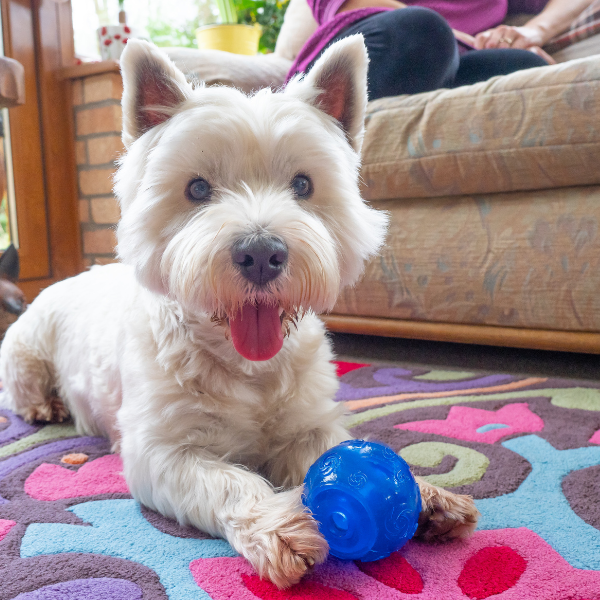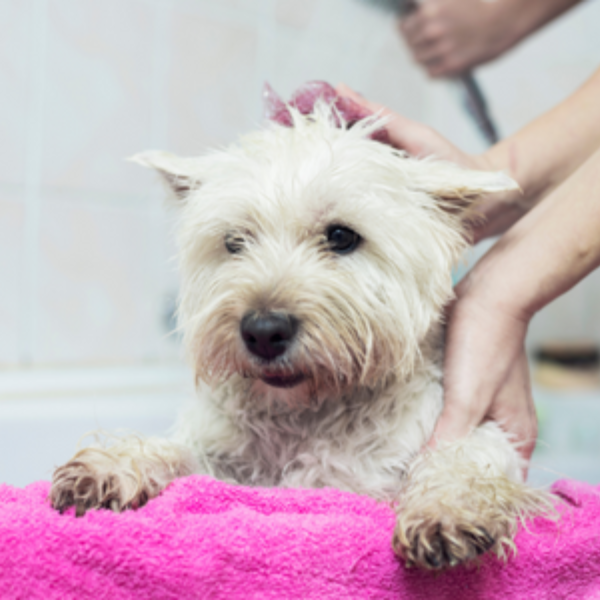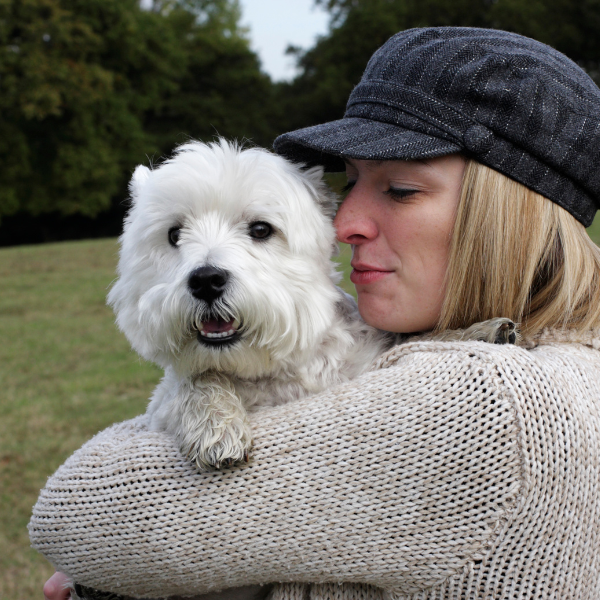Don’t Know What to Do About Your Itchy Dog?
Westies are prone to several skin conditions and seasonal allergies making life miserable for your bestie so it’s vital you understand the steps to take to fix it.

A diverse, healthy, and dynamic microbiome supports good health, well-being, and immunity. This is one of the most important factors in dog skin allergy care.
Two of the most important words in itchy dog management are ‘external microbiome’. In fact, the external microbiome is the missing piece in so many areas of your Westie’s well-being. If you are not familiar with the microbiome, or how to keep the microbiomes in your Westie’s life balanced and healthy – read on to find out more!
There has been a huge increase in poorly, ‘itchy dogs’ in recent years, according to a study published in MDPI, a Veterinary Sciences Journal, and Westies are among them. Although Westies are generally robust, they can have a genetic predisposition to several skin conditions. These include uncomfortable reactions caused by environmental and seasonal allergens.
Young dogs are especially susceptible to these bio-allergens, and symptoms often develop before the age of three. This can make life miserable for your beloved Westie – and for you:

Sound familar?
Itching and scratching
Chewing and licking – particularly paws
Inflamed skin, rashes, and redness
Dry, flaky skin
Recurrent ear infections – shaking head
Hair loss and dandruff
Unpleasant odour
Unfortunately, if your Westie has itchy skin, you’ll know how complex, chronic, and hard to resolve this tough condition can be. The problem is, there is rarely one clear cut cause – and if there is, it is hard to pinpoint. Instead, there are a myriad of possibilities, including:
- Diet and lifestyle
- Seasonal allergens (grass, tree, and leaf pollen)
- Exposure to chemicals – including household cleaning products
- Microbes (parasites, bacteria, mould)
- House dust mite poop
- Pollutants in their outdoor environment
Most dogs can’t escape these everyday allergens that trigger their symptoms. They often don’t understand the need to stay away from them – or can’t tell you what they suspect is making them unwell. In addition, their attempts to alleviate the itching by licking and scratching often makes things worse. This all makes itchy skin hard to resolve; it can easily develop into a frustrating and life-long chronic condition.
The Microbiome and Allergic Skin Disease
So, back to the most important words in itchy skin relief: the external microbiome.
The microbiome is the natural community of microorganisms, including bacteria (‘good’ and ‘bad’), viruses and fungi, that exist on skin, in the gut, and on all surfaces, including your home
A diverse, healthy, and dynamic microbiome supports good health, well-being and immunity. This is one of the most important factors in dog skin allergy care.Problems with itchy dogs can increase when either the microbiome on their skin (the ‘skin biome’) and/or in their home (the ‘home biome’) is out of balance.
Restoring and maintaining healthy microbiome balance is key to protecting and preventing Westies from the nightmare of itchy skin.

The Skin Biome
A healthy skin biome provides a defensive barrier that shields your Westie from the external influences and bio-allergens listed above. Unfortunately, many traditional treatments (antihistamines, steroids, medicated and anti-bacterial shampoos, repeated antibiotics, antifungals…) focus only on symptoms. They don’t resolve a key root cause – the disrupted microflora – or reduce exposure to the bio-allergens that constantly trigger reactions.
Some treatments act like a nuclear bomb, wiping out all microorganisms in the microbiome – both helpful and harmful. This creates disruption at a cellular level and increases the risk of repeat infections, yeast overgrowth, atopic dermatitis, allergies and more. This can tip your poor Westie into a chronic cycle of recurring flare-ups of bacterial and yeast infections.
Repeat outbreaks and repeat treatments, are stressful for your poorly pet and can cost you a small fortune.
(Note: Although the indiscriminate and overuse of antibiotics causes problems, when antibiotics are genuinely needed there is nothing better; always finish the course if prescribed).
The Home Biome
A healthy home biome creates a protective indoor space that supports your Westie’s health and well-being. The problem is, chemical cleaning products and air fresheners are proven to cause long-term health issues for pets (as well as humans). Floor cleaning products are especially problematic if your cheeky pooch walks on your freshly chemically cleaned floor with sweaty or wet paws – and then licks those paws.
Many contain phthalates, parabens, QUATs, GMO or chemicals of concern such as Methylisothiazolinone (MIT) and Phenoxyethanol. These toxins are also designed to destroy the microbiome. Cleaning products boasting ‘kills 99.9% of all known germs’ should send shivers down your spine!

How to Restore and Maintain Healthy Microflora Balance in the Microbiome
Itchy skin is often a complex condition but making small improvements in different areas of your Westie’s life can make a big improvement overall. Like athletes, consistent marginal gains make a significant difference.
One easy improvement is to re-introduce healthy, ‘good’ bacteria (probiotics) externally to your Westie’s skin and home environment. This works in a similar way to probiotic supplements that support and rebalance your Westie’s digestion and gut health.
Introducing healthy bacteria into your Westie’s life is beneficial – the World Health Organisation (WHO) agrees!
The ‘Itchy Westie’ Remedy Plan with Probiotics
Simply swapping microbiome-damaging pet care and cleaning products for microbiome-friendly, properly pet-safe versions with added probiotics can make a big improvement. This instantly reduces chemical exposure and rebuilds and regulates a healthy biome that supports your Westie’s immunity and well-being.
Helpful probiotics actively remove harmful bacteria, pollen, dust-mites and more. They remain active on the skin, coat, and other surfaces for up to three days.
This simple step in the right direction helps to:
- Restore and maintain a healthier skin and home biome.
- Prevent and limit exposure to environmental triggers.
- Soothe and alleviate symptoms.
Adding probiotics also works pro-actively – prevention is always better than cure.
Step 1: Replenish the Skin Biome
Introduce a healthy shampoo and skin spray with added probiotic as ‘good’ bacteria restores a healthy microbiome and reduces allergen exposure. This gently reduces inflammation, itching, odour, and redness and restores healthier sebum and skin.
Secondly, apply a Probiotic Allergen-Free Spray twice daily onto the skin and coat for the first few days and then reduce to one, then use as required to relieve itching. This healthy spray prevents, protects, and relieves itchy skinand reduces excessive scratching, hot spots, rashes, and flaky skin.
You can also spray directly onto your bedding, toys, (especially stuffed toys,) coats and harnesses to reduce hidden allergens lurking there.
Step 2: Replenish your Home Biome
Firstly, clean floors (and carpets if desired) with a Probiotic Floor Cleaner Concentrate.Anaturally sourced floor cleaner reduces your Westie’s skin-to-skin contact with chemicals as well as environmental bio-allergens that settle on the floor. The healthy probiotics remain on the floor and keep working for up to three days, for longer lasting results.
Secondly, clean the hard surfaces where your dog hangs out – around your home, in your car and any kennels or pet carriers with a probiotic cleaner. A versatile, naturally sourced all-purpose cleaner is safe for your Westie and the environment. The added probiotics actively reduce bio-allergens, improve indoor air quality, and reduce odours and organic waste.
This promotes a healthier home biome that is a safer space for you as well as your pet!






